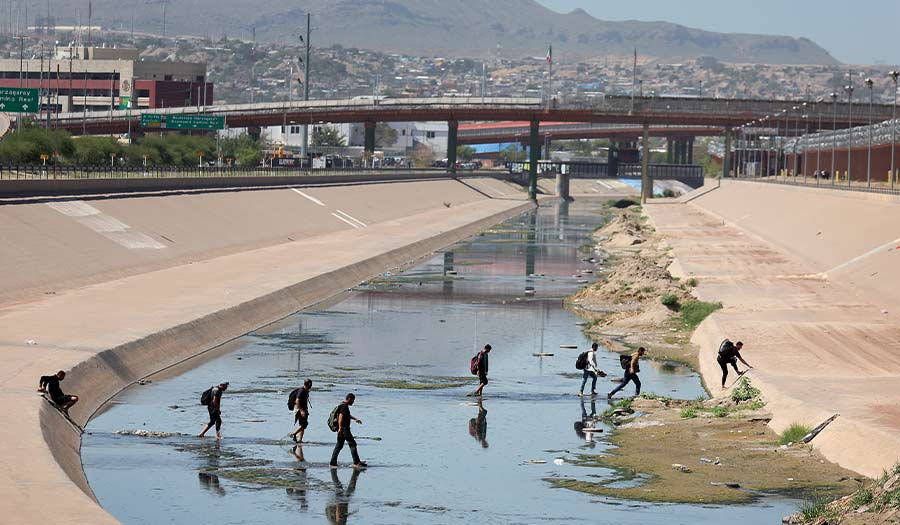 AP/Sunday Alamba
AP/Sunday Alamba
World News Desk
Learn the why behind the headlines.
Subscribe to the Real Truth for FREE news and analysis.
Subscribe NowNAIROBI, Kenya (AP) – The new global epicenter of violent Islamic extremism is sub-Saharan Africa where people are increasingly joining because of economic factors and less for religious ones, says a new report by the UN’s international development agency.
A significant increase of 92 percent of new recruits to extremist groups are joining for better livelihoods compared to the motivations of those interviewed in a previous report released in 2017, according to the UNDP report released on Tuesday.
Many Africans’ lives have been badly affected by the COVID-19 pandemic, high inflation and other factors, said the report.
There has been a 57 percent decrease in the number of people joining extremist groups for religious reasons, it said.
Nearly 2,200 people were interviewed for the report in eight African countries: Burkina Faso, Cameroon, Chad, Mali, Niger, Nigeria, Somalia and Sudan. More than 1,000 interviewees were former members of violent extremist groups, both voluntary and forced recruits, said the report.
At least 4,155 attacks across Africa were documented since 2017, said the report. In these attacks, 18,417 deaths were recorded in the continent with Somalia accounting for the largest number of fatalities.
The Somali government is currently carrying out what has been described as the most significant offensive against the al-Shabab extremist group in more than a decade.
Those interviewed were drawn from various extremist groups across the continent including Boko Haram in Nigeria, al-Shabab in Somalia, which pledges allegiance to al-Qaida, and in West Africa Jama’at Nusrat al-Islam wal Muslimeen, or JNIM, which is allied to the Islamic State group.
“Sub-Saharan Africa has become the new global epicenter of violent extremism with 48% of global terrorism deaths in 2021,” UNDP administrator Achim Steiner said in a press briefing ahead of the report’s launch.
This surge in extremism in Africa “not only adversely impacts lives, security, and peace, but also threatens to reverse hard-won development gains for generations to come,” he said.
Military campaigns to stamp out extremism are not proving to be successful, said Mr. Steiner.
“Security-driven counter-terrorism responses are often costly and minimally effective, yet investments in preventive approaches to violent extremism are woefully inadequate,” he said. “The social contract between states and citizens must be reinvigorated to tackle root causes of violent extremism.”
About 71 percent of those who joined extremist groups were influenced by human rights abuses by state security forces, such as the killings or arrests of family members, said the report.
Security forces in some sub-Saharan countries have been accused of brutality and extrajudicial killings and weak judicial systems give victims little hope for justice, it said.
Nigeria’s Boko Haram and its offshoot, the Islamic State in West Africa Province, have grown in influence by using money to entice impoverished communities, Hassan Chibok, a community leader in Nigeria’s Borno state where the conflict is concentrated, told The Associated Press in a separate interview.
Those who left the extremist groups cited unmet expectations, particularly the lack of sustained financial benefits, and an absence of trust in extremist leaders as their main reasons for quitting.
“Research shows that those who decide to disengage from violent extremism are less likely to rejoin and recruit others,” said the report.
“This is why it’s so important to invest in incentives that enable disengagement,” said Nirina Kiplagat, a UNDP specialist in preventing violent extremism in Africa. “Local communities play a pivotal role in supporting sustainable pathways out of violent extremism, along with national governments’ amnesty programs.”
The UNDP report recommends better basic services including child welfare, education, and quality livelihoods to prevent people from voluntarily joining extremist groups. It also urged the creation of more exit opportunities and investment in rehabilitation and community-based reintegration services.
- Real Truth Magazine Articles
- ECONOMY & PERSONAL FINANCE
 Economic Disparity
Economic Disparity
More on Related Topics:
- Libya’s Instability Will Worsen Further Without a Unified Government and Elections, UN Envoy Says
- U.S. Warns a Famine in Sudan Is on Pace to Be the Deadliest in Decades as the World Looks Elsewhere
- U.S. Hands Over Its Last Military Base in Niger to the Ruling Junta
- Rights Group Says Sexual Violence Is Rampant in Sudan’s Conflict
- 755,000 People at Risk of Famine in Coming Months in War-torn Sudan, Experts Warn


